- Serbia
Get to know Serbia
- Citizens
Culture and science
Health services
Pension and disability insurance
- Business
Employment
Economy
- Media
- Government
- Contact
Keep in touch
Contact form
Back
Keepin touch
Whether you have a question, comment, suggestion or any problem in the purview of the government, send us your message and we will try to respond as soon as possible. If your problem is not in our purview, we will forward your message to the relevant institution.
Q:
A:
Negotiations on Serbia’s accession to WTO to be completed next year
Belgrade,
2 June 2010
State Secretary of the Ministry of Economy and Regional Development Vesna Arsic said today that negotiations on Serbia’s accession to the World Trade Organisation (WTO) are expected to be completed in 2011.
At a workshop for the media themed “The World Trade Organisation and status of negotiations on Serbia’s accession”, Arsic said that multilateral talks are in the final stage, while a further course of negotiations and the time of their completion will mostly depend on how quickly Serbia adopts laws from certain areas.
The last, eighth meeting of the Working group for Serbia’s accession to the WTO was held on 5 March this year, while the next meeting is planned for September. Arsic specified that the talks are held on multilateral and bilateral levels. The issues that remain unresolved are those related to the right to trade and to import permits. She affirmed that a bilateral protocol on completion of negotiations was signed with Japan, and that negotiations have been completed with Norway, Canada, Switzerland and the EU. Bilateral negotiations related to customs in agriculture and industry are on course with the US, Ecuador, El Salvador, Korea, Brazil and Ukraine.
The State Secretary highlighted that one of the problems in the accession process is that the WTO member states are allowed to ask for bilateral negotiations at the last moment. She gave the example of Montenegro, which together with Serbia and Bosnia and Herzegovina, is outside the WTO. At the very end of negotiations for its accession, Ukraine requested bilateral talks. Arsic explained that in the bilateral negotiations, talks on customs rates for 2,500 to 3,000 products might be launched. As an example, she said that Switzerland raised the question of customs rates for cheeses, chocolates, biscuits, the US for chicken meat, nuts, whiskey and frozen citrus fruit juices. Brazil opened the issue for sugar, pork, chicken and beef meat, and Norway for various fish. Assistant Minister of Economy and Regional Development Bojana Todorovic pointed out that WTO membership is a precondition for Serbia’s accession into the EU.
She underlined that the WTO is the only international organisation that regulates the legal framework for international trade and controls 80% of world trade, 90% of financial transactions, 92% of telecommunication and information technologies and 97% of intellectual property rights.
At this moment, 30 countries are in the process of accession. The average duration of the accession process is six years, however, China negotiated for 15 years and five months and Russia has been negotiating since 1993.
The last, eighth meeting of the Working group for Serbia’s accession to the WTO was held on 5 March this year, while the next meeting is planned for September. Arsic specified that the talks are held on multilateral and bilateral levels. The issues that remain unresolved are those related to the right to trade and to import permits. She affirmed that a bilateral protocol on completion of negotiations was signed with Japan, and that negotiations have been completed with Norway, Canada, Switzerland and the EU. Bilateral negotiations related to customs in agriculture and industry are on course with the US, Ecuador, El Salvador, Korea, Brazil and Ukraine.
The State Secretary highlighted that one of the problems in the accession process is that the WTO member states are allowed to ask for bilateral negotiations at the last moment. She gave the example of Montenegro, which together with Serbia and Bosnia and Herzegovina, is outside the WTO. At the very end of negotiations for its accession, Ukraine requested bilateral talks. Arsic explained that in the bilateral negotiations, talks on customs rates for 2,500 to 3,000 products might be launched. As an example, she said that Switzerland raised the question of customs rates for cheeses, chocolates, biscuits, the US for chicken meat, nuts, whiskey and frozen citrus fruit juices. Brazil opened the issue for sugar, pork, chicken and beef meat, and Norway for various fish. Assistant Minister of Economy and Regional Development Bojana Todorovic pointed out that WTO membership is a precondition for Serbia’s accession into the EU.
She underlined that the WTO is the only international organisation that regulates the legal framework for international trade and controls 80% of world trade, 90% of financial transactions, 92% of telecommunication and information technologies and 97% of intellectual property rights.
At this moment, 30 countries are in the process of accession. The average duration of the accession process is six years, however, China negotiated for 15 years and five months and Russia has been negotiating since 1993.
-
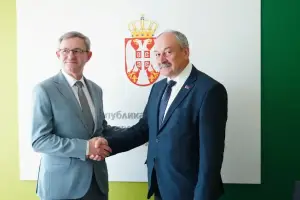 Belgrade, 11 July 2025
Belgrade, 11 July 2025Potential for improving cooperation with Belarus in many areas
-
 Požega, 5 July 2025
Požega, 5 July 2025Section of Pakovraće - Požega highway officially opened
-
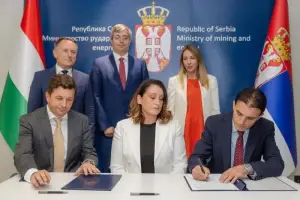 Belgrade, 2 July 2025
Belgrade, 2 July 2025Technical specifications defined for Serbia-Hungary oil pipeline
-
 Belgrade, 30 June 2025
Belgrade, 30 June 2025IMF confirms Serbia successfully implementing all agreed reforms
-
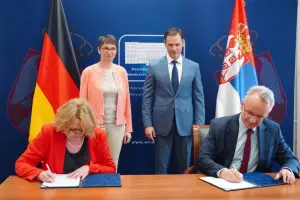 Belgrade, 27 June 2025
Belgrade, 27 June 2025Double Taxation Avoidance Agreement with Germany signed
-
 Kostolac, 25 June 2025
Kostolac, 25 June 2025Construction of Kostolac wind farm nearing completion
-
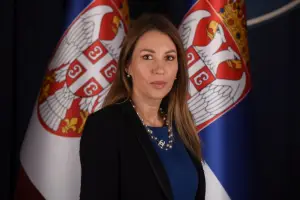 Belgrade, 24 June 2025
Belgrade, 24 June 2025Government supports request for new postponement of sanctions against NIS
-
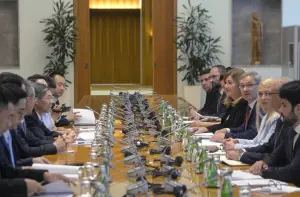 Belgrade, 23 June 2025
Belgrade, 23 June 2025Procedures to facilitate sale of Serbian products to China to be accelerated
-
 Belgrade, 21 June 2025
Belgrade, 21 June 2025Serbia receives first funds under Growth Plan for the Western Balkans
-
 Belgrade/Cairo, 20 June 2025
Belgrade/Cairo, 20 June 2025New phase in relations with Egypt in field of agriculture

